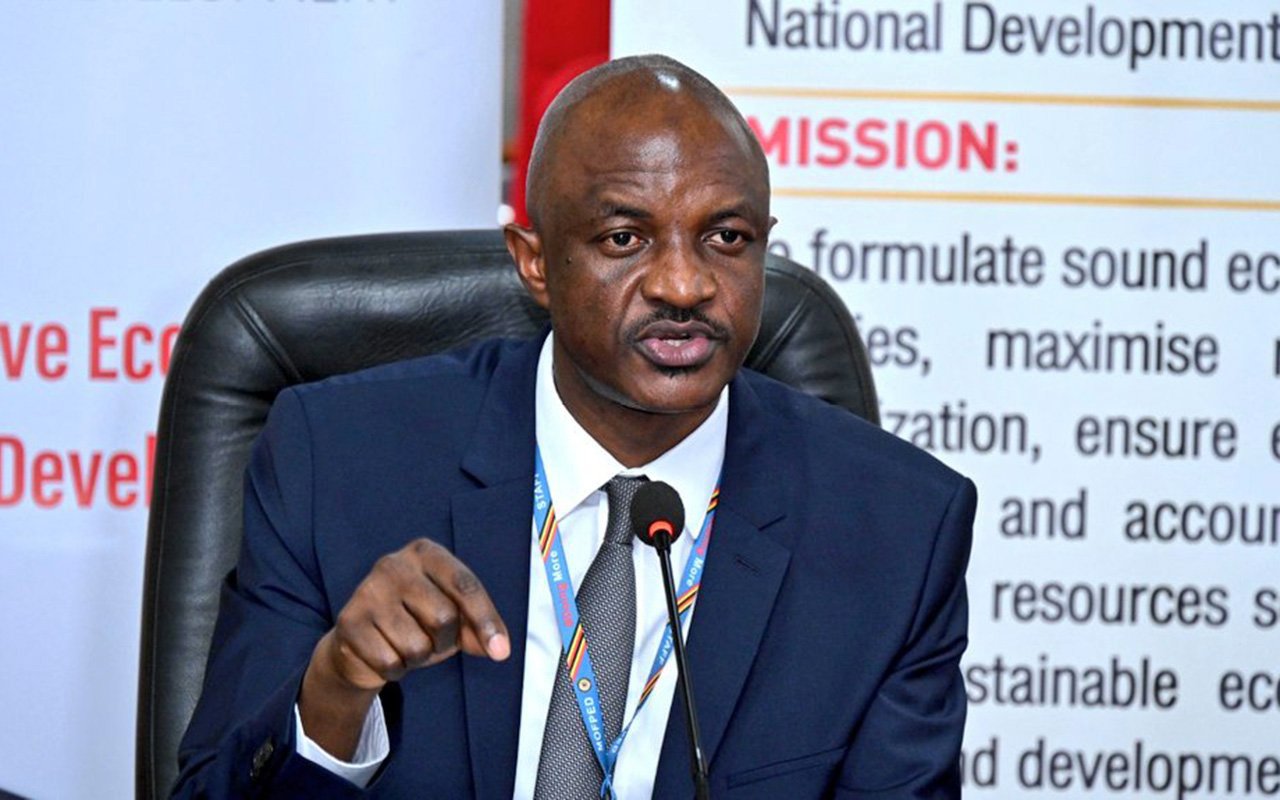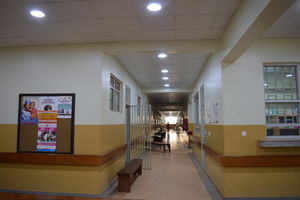
The Permanent Secretary in the Finance Ministry, Mr Ramathan Ggoobi, addresses the media in Kampala in April. His ministry on July 16, 2024 released Shs5.899 trillion for quarter one of the Financial Year 2024/2024. PHOTO/COURTESY OF FINANCE MINISTRY
Since Uganda’s economy has fully recovered from various shocks, the Ministry of Finance, Planning and Economic Development on July 16 released Shs5.899 trillion for quarter one of the financial year 2024/2024, which is Shs21.3 percent of the discretionary budget.
Public budgeting is the process by which governments prepare and approve their strategic allocations of public resources. This involves both the development and the recurrent expenditure, which all have been planned and budgeted for this fiscal year 2024/2025 to spur economic activities in the country for consumption and investments.
Speaking during the release of quarter one budget expenditure at the Ministry of Finance, Planning and Economic Development headquarters in Kampala yesterday, the Permanent Secretary/Secretary to Treasury, Mr Ramathan Ggoobi said: “All government operations this financial year will underpin fiscal discipline, budget credibility, commitment to service delivery and timely project execution.”
Mr Ggoobi said the quarter one expenditure limits for the financial year 2024/2025 were derived from the work plans and procurement plans of MDAs and taking into consideration the available resources for quarter one of the fiscal year 2024/2025.
Shortages
To ensure that there are no shortages in wages and salaries, Mr Ggoobi warned against illegal recruitments saying no recruitment should be done without clearance from the Ministry of Public Services after ascertaining the availability of adequate wages from the Ministry of Finance, Planning and Economic Development.
In a related move, Mr Ggoobi said: “Accounting officers are required to ensure every promotion and redeployment of staff made to a different cost centre should be backed up with adequate wages provision.”
Giving a breakdown of the released fund, Mr Ggoobi said Shs1.990 trillion will cater for wages and salaries across government institutions.
For the Non-Wages Recurrent expenditure, Mr Ggoobi said Shs323.50 billion has been released for pension and gratuity; Shs308.75 billion to Local Governments including Education Capitation Grants (Shs112.28 billion) to cater for a third term of the school year.
“Shs95.26 billion to all public universities, Uganda Management Institute and Law Development Centre in line with semester requirements; Shs43.77 billion for examination bodies, that is Uganda National Examination Board (Uneb) and Uganda Business and Technical Examinations Board (UBTEB),” he said.
Mr Ggoobi said all missions abroad will get Shs100.58 billion (representing 50 percent of the annual budget) to hedge them against loss of poundage; Shs124.63 billion has been released to National Council of Sports including payment of Africa Cup of Nation (Afcon) commitment fees, equivalent to $30 million (Shs110.8 billion).
Health institutions
Health institution funds have also been released for referral hospitals (Shs2258 billion), Uganda Cancer Institute (Shs12.31 billion), Uganda Heart Institute (Shs7.06 billion); Uganda Blood Transfusion Services (UBTS) (Shs4.1 billion), Subvention under the Ministry of Health for medical interns’ salaries Shs21.85 billion.
Mr Ggoobi said the money for medical interns is now available.
In addition, he said Shs173.68 billion has been released to National Medical Stores (NMS) for the purchase of essential drugs and medicines.
Mr Ggoobi further announced that in quarter one, the government has catered for the following contract staff salaries; Uganda Revenue Authority (Shs21.76 billion), Kampala Capital City Authority (Shs14.34 billion), Ministry of Finance, Planning and Economic Development (Shs22.67 billion), and Shs14.53 billion for Resource Enhancement and Accountability Programme (REAP).
The development expenditure has also been provided by the Intergovernmental Fiscal Transfers Programme. Under this programme, Local government will receive Shs229.27 billion in grants, representing one-third of the development grant allocations; and all missions abroad Shs29.4 billion.
Economic activity has remained on a recovery path despite recent global challenges like tighter financial conditions and increased global tensions which disrupt supply chains and the Ministry of Finance, Planning and Economic Development has confirmed that Uganda’s economy has fully recovered from various shocks.
“Economic growth in FY 2024/2025 is projected to be between six and 6.5 percent, rising above seven percent in the subsequent years driven by our Tenfold Growth strategy. This strategy hinged on increased investment and growth in agro-industry; tourism development; mineral development including oil and gas activities and science, technology and innovation (STI) including ICT.
Mr Ggoobi said the government has also implemented a pro-active industrial policy that has helped to add value to agricultural and mineral commodities, replace some of the hitherto imported products, and boost export earnings. Manufactured products are increasingly becoming a significant contributor to Uganda’s export earnings.
Funding gap
The executive director of CSBAG, Mr Julius Mukunda, said they are wondering where the government is going to get the money to fund the Shs72 billion budget when even financing Shs52.7 trillion was a challenge.
“I wonder whether there is a budget for an extra 11.3 million people that have been revealed in the UBOS National Population and Housing Census 2024 results,” he said. Are we prepared to have more budget for them? he asked.
Operational funds for security institutions
Institution | Amount |
Ministry of Defence and Veteran Affairs | Shs253.30 billion |
Uganda Police Force | Shs56.43 billion |
Uganda Prison Services | Shs44.79 billion |
ISO | Shs28.08 billion |
ESO | Shs19.44 billion |
Parliament | Shs153.60 billion |
Judiciary | Shs47.40 billion |
Auditor General | Shs10.11 billion |
Science Technology and Innovation | Shs124.63 billion |
Uganda National Oil Company (UNOC) for equity acquisition in East African Crude Oil Pipeline (EACOP) | Shs124 billion |
Domestic arrears | Shs199.83 billion |
International Court of Justice award to DR Congo | Shs247 billion |








